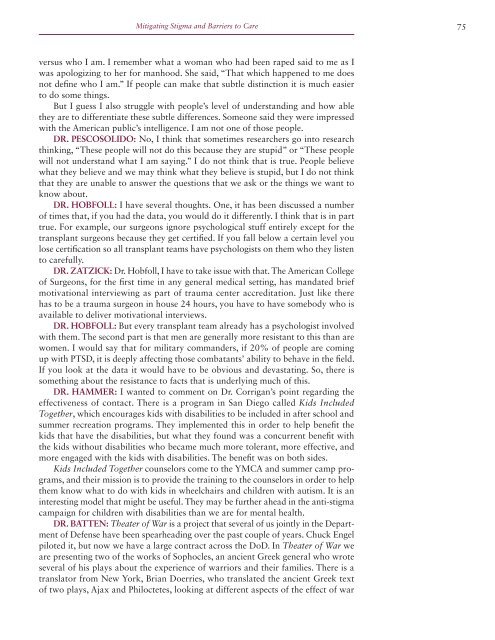stigma and barriers to care - Uniformed Services University of the ...
stigma and barriers to care - Uniformed Services University of the ...
stigma and barriers to care - Uniformed Services University of the ...
Create successful ePaper yourself
Turn your PDF publications into a flip-book with our unique Google optimized e-Paper software.
Mitigating Stigma <strong>and</strong> Barriers <strong>to</strong> Care 75<br />
versus who I am. I remember what a woman who had been raped said <strong>to</strong> me as I<br />
was apologizing <strong>to</strong> her for manhood. She said, “That which happened <strong>to</strong> me does<br />
not define who I am.” If people can make that subtle distinction it is much easier<br />
<strong>to</strong> do some things.<br />
But I guess I also struggle with people’s level <strong>of</strong> underst<strong>and</strong>ing <strong>and</strong> how able<br />
<strong>the</strong>y are <strong>to</strong> differentiate <strong>the</strong>se subtle differences. Someone said <strong>the</strong>y were impressed<br />
with <strong>the</strong> American public’s intelligence. I am not one <strong>of</strong> those people.<br />
DR. PESCOSOLIDO: No, I think that sometimes researchers go in<strong>to</strong> research<br />
thinking, “These people will not do this because <strong>the</strong>y are stupid” or “These people<br />
will not underst<strong>and</strong> what I am saying.” I do not think that is true. People believe<br />
what <strong>the</strong>y believe <strong>and</strong> we may think what <strong>the</strong>y believe is stupid, but I do not think<br />
that <strong>the</strong>y are unable <strong>to</strong> answer <strong>the</strong> questions that we ask or <strong>the</strong> things we want <strong>to</strong><br />
know about.<br />
DR. HOBFOLL: I have several thoughts. One, it has been discussed a number<br />
<strong>of</strong> times that, if you had <strong>the</strong> data, you would do it differently. I think that is in part<br />
true. For example, our surgeons ignore psychological stuff entirely except for <strong>the</strong><br />
transplant surgeons because <strong>the</strong>y get certified. If you fall below a certain level you<br />
lose certification so all transplant teams have psychologists on <strong>the</strong>m who <strong>the</strong>y listen<br />
<strong>to</strong> <strong>care</strong>fully.<br />
DR. ZATZICK: Dr. Hobfoll, I have <strong>to</strong> take issue with that. The American College<br />
<strong>of</strong> Surgeons, for <strong>the</strong> first time in any general medical setting, has m<strong>and</strong>ated brief<br />
motivational interviewing as part <strong>of</strong> trauma center accreditation. Just like <strong>the</strong>re<br />
has <strong>to</strong> be a trauma surgeon in house 24 hours, you have <strong>to</strong> have somebody who is<br />
available <strong>to</strong> deliver motivational interviews.<br />
DR. HOBFOLL: But every transplant team already has a psychologist involved<br />
with <strong>the</strong>m. The second part is that men are generally more resistant <strong>to</strong> this than are<br />
women. I would say that for military comm<strong>and</strong>ers, if 20% <strong>of</strong> people are coming<br />
up with PTSD, it is deeply affecting those combatants’ ability <strong>to</strong> behave in <strong>the</strong> field.<br />
If you look at <strong>the</strong> data it would have <strong>to</strong> be obvious <strong>and</strong> devastating. So, <strong>the</strong>re is<br />
something about <strong>the</strong> resistance <strong>to</strong> facts that is underlying much <strong>of</strong> this.<br />
DR. HAMMER: I wanted <strong>to</strong> comment on Dr. Corrigan’s point regarding <strong>the</strong><br />
effectiveness <strong>of</strong> contact. There is a program in San Diego called Kids Included<br />
Toge<strong>the</strong>r, which encourages kids with disabilities <strong>to</strong> be included in after school <strong>and</strong><br />
summer recreation programs. They implemented this in order <strong>to</strong> help benefit <strong>the</strong><br />
kids that have <strong>the</strong> disabilities, but what <strong>the</strong>y found was a concurrent benefit with<br />
<strong>the</strong> kids without disabilities who became much more <strong>to</strong>lerant, more effective, <strong>and</strong><br />
more engaged with <strong>the</strong> kids with disabilities. The benefit was on both sides.<br />
Kids Included Toge<strong>the</strong>r counselors come <strong>to</strong> <strong>the</strong> YMCA <strong>and</strong> summer camp programs,<br />
<strong>and</strong> <strong>the</strong>ir mission is <strong>to</strong> provide <strong>the</strong> training <strong>to</strong> <strong>the</strong> counselors in order <strong>to</strong> help<br />
<strong>the</strong>m know what <strong>to</strong> do with kids in wheelchairs <strong>and</strong> children with autism. It is an<br />
interesting model that might be useful. They may be fur<strong>the</strong>r ahead in <strong>the</strong> anti-<strong>stigma</strong><br />
campaign for children with disabilities than we are for mental health.<br />
DR. BATTEN: Theater <strong>of</strong> War is a project that several <strong>of</strong> us jointly in <strong>the</strong> Department<br />
<strong>of</strong> Defense have been spearheading over <strong>the</strong> past couple <strong>of</strong> years. Chuck Engel<br />
piloted it, but now we have a large contract across <strong>the</strong> DoD. In Theater <strong>of</strong> War we<br />
are presenting two <strong>of</strong> <strong>the</strong> works <strong>of</strong> Sophocles, an ancient Greek general who wrote<br />
several <strong>of</strong> his plays about <strong>the</strong> experience <strong>of</strong> warriors <strong>and</strong> <strong>the</strong>ir families. There is a<br />
transla<strong>to</strong>r from New York, Brian Doerries, who translated <strong>the</strong> ancient Greek text<br />
<strong>of</strong> two plays, Ajax <strong>and</strong> Philoctetes, looking at different aspects <strong>of</strong> <strong>the</strong> effect <strong>of</strong> war




